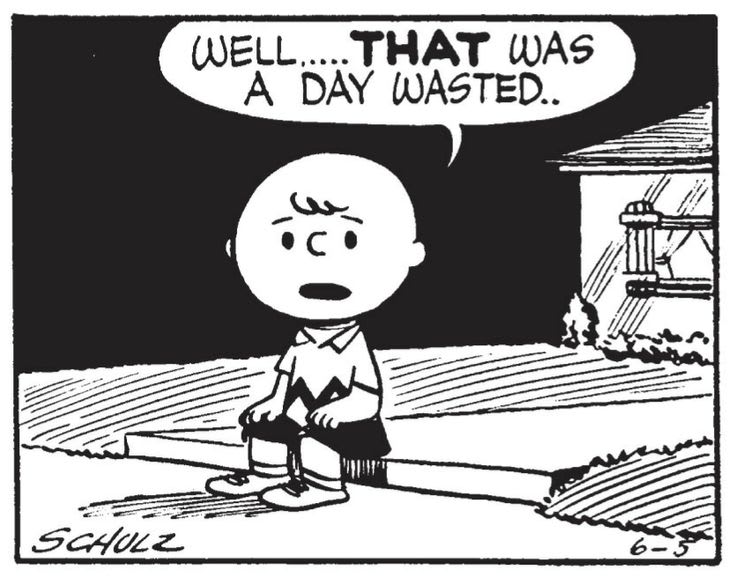The Ministry of Presence
Homily for Sunday, May 18, 2025: Fifth Sunday of Lent, Year C
There is an old Peanuts comic strip in which Charlie Brown leaves his house in the morning, wondering what the rest of the gang is up to for the day. Then he stops and realizes, I’m always going to them to see what they’re doing. Maybe I should let them come to me this time. He sits down on the stoop in front of the house and says, I’m just going to sit right here until they come find me.
In the last panel it’s dark, Charlie Brown is still sitting on the stoop saying, well that was a day wasted.
It’s something I think we can all sympathize with, isn’t it? We all have those moments with our friends, our family, our loved ones, those moments of wanting to know that they’re as invested in the relationship as we are. Ideally we want a relationship that is give-and-take, where we’re both making some effort.
That is why we all come in to Church this weekend, right? This is our opportunity to give ourselves to that relationship with Christ.
It’s kind of interesting, isn’t it, that today’s Gospel reading takes us back a few weeks, back to a few days before Easter, back to the Last Supper. This Gospel reading begins by telling us that Judas has just left. So we know where we are in the narrative.
We know this is the beginning of the loneliest point in Jesus’s life. Judas has gone to betray him; the other disciples will sleep through his anguished prayers, then abandon him to arrest and execution.
We remember this, and so we come today, on a weekend morning when like the disciples we would rather be sleeping, we give this hour of our time to be with Him, who has given himself fully to us.
As we come to church, as we pray to God, as we work at having a relationship with Jesus, we may at times feel like Charlie Brown sitting on the stoop. We may find ourselves wondering, where is God? Why doesn’t he answer? Wondering if we’re wasting the day, waiting for the time when God will take us to heaven.
In popular imagination we tend to imagine at the end of our lives, at the end of time, we are taken up into heaven to be with God. But our second reading from Revelation speaks of God’s Holy City coming down from heaven to us. Behold, we are told, God’s dwelling is with the human race. He will dwell with them and they will be his people and God himself will always be with them as their God.
Revelation gives us the metaphor of a bride and bridegroom coming together in marriage. We, the Church, are the metaphorical Bride whom Christ the Bridegroom unites himself to.
In any marriage, of course, the couple at some point has to deal with the question of where they will live. Especially if they are each from a different region or town or state or country, there has to be some negotiation made through love where one will pack up and move to where the other is, or vice versa. In Revelation, we are told that after that wedding feast the Lamb will relocate – not just himself but his entire city – relocate to where we are to live with us forever.
This is how much God loves us, how much he wants to be with us. He takes on flesh in the person of Jesus Christ. He makes himself present on the altar as bread and wine. He waits for us here in the tabernacle, and even in our daily lives he is closer to us than we can ever know. Waiting only for us to notice, to acknowledge, to make some time for him.
And he asks one thing of us. As he prepares to go alone to his crucifixion and death he gives his disciples one final directive: Love one another as I have loved you. This is what he asks of us as well.
To make time for one another. To be present to one another. To give of ourselves to others as he gives himself to us. To not waste the day sitting on the stoop, but to go out and bring his love to a waiting world.


